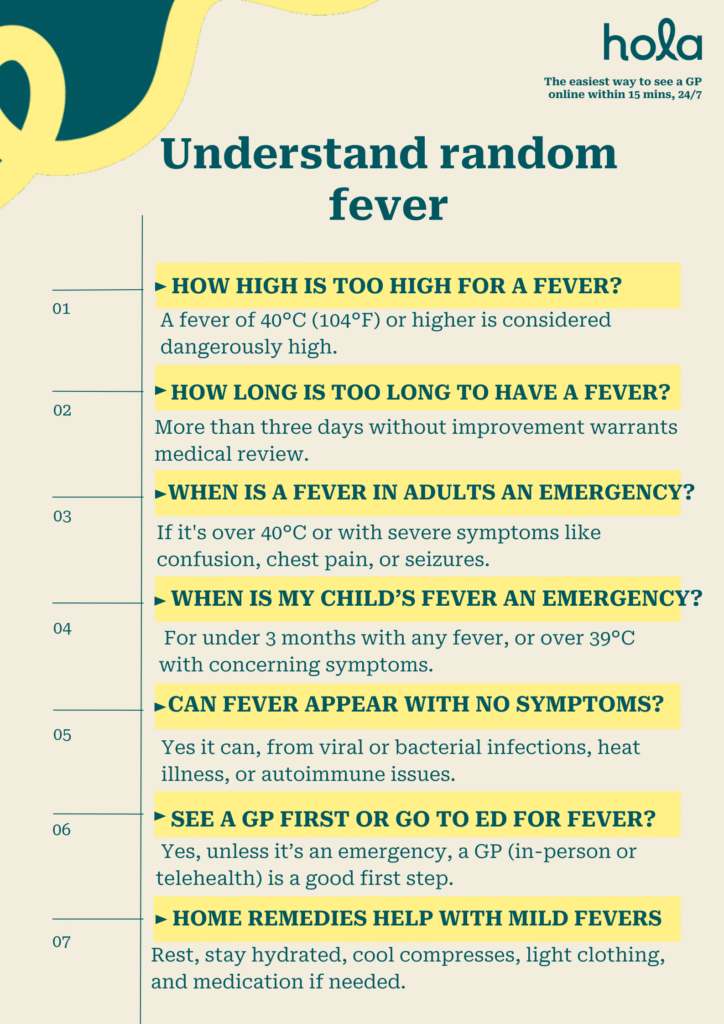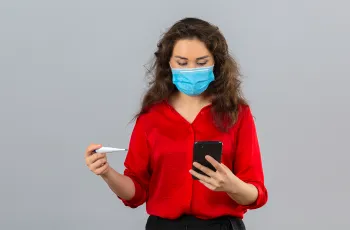Random fever: Should I go to the emergency department?
Written by Dr.Gosagan Gopalakrishnan, BSc (Hons), MBChB, DRCOG, MRCGP, FRACGP.

Contents

Summary: A sudden fever without obvious symptoms can be worrying, especially after travel. While most fevers settle with rest, hydration, and medication, it’s important to know when to seek medical care. Adults should head to the ED if the fever exceeds 40°C or is paired with severe symptoms, while children under 3 months need urgent care for any fever. For mild or unclear cases, a telehealth online GP consult is a smart first step
Random fever: Emergency department visit or at-home care?
A friend of mine had just returned from a trip to India when he developed a fever - no sore throat, no cough, no runny nose, just a sudden spike in temperature. Naturally, he was worried. Should he head straight to the emergency department, or wait it out at home? It’s a common dilemma, and one that got me thinking about this blog. A fever can be concerning, especially when it appears suddenly and without an obvious cause. While most fevers resolve on their own, knowing when to seek medical help is crucial. This guide will help you determine when a fever requires urgent attention - and whether a telehealth consultation might be a sensible first step.What to do if you have a random fever?
A fever is the body's natural response to infection or inflammation. If you experience a sudden fever, consider these initial steps:- Rest and stay hydrated.
- Take paracetamol or ibuprofen as (as long as they are not contraindicated. A contraindication means it is unsafe to take the medication. For example, ibuprofen may be unsuitable if you have an allergy to it, suffer from reflux, or have asthma).
- Monitor your temperature regularly.
- Observe for additional symptoms such as chills, sweating, rash, or breathing difficulties.
When to seek immediate medical attention for a fever
You should seek emergency care if you or someone else experiences:- A fever above 40°C (104°F).
- Severe headache, confusion, or difficulty staying awake.
- Shortness of breath or chest pain.
- Seizures.
- Stiff neck and sensitivity to light (possible meningitis).
- Persistent vomiting or inability to keep fluids down.
- Signs of dehydration, such as dizziness, confusion, or reduced urination.
- Fever accompanied by a non-blanching rash (possible meningococcal infection).
Feeling sick and unsure why? Speak with a GP online in 15 minutes.
See a Doctor now
Available 24/7, across Australia.
At what point should you go to the ED for a fever?
For most adults, a fever alone is not an immediate emergency. However, if it lasts more than three days, is extremely high, or is accompanied by severe symptoms, you should go to the emergency department. For children, fever management depends on their age:- Under 3 months: Any fever above 38°C requires immediate medical attention.
- 3-6 months: A fever over 38.5°C, especially with other symptoms, should prompt a doctor visit.
- Over 6 months: Seek medical help if the fever exceeds 39°C, lasts more than 48 hours, or is accompanied by concerning symptoms.
How long is too long to have a fever?
A fever that lasts longer than three days without improvement or recurs frequently may indicate an underlying condition that requires medical evaluation.When to take a child to the hospital for a fever in Australia?
In Australia, parents are advised to seek medical care for a child’s fever if:- The child is under 3 months old with any fever.
- They have a fever above 39°C and seem lethargic or irritable.
- There is difficulty breathing, persistent vomiting, or signs of dehydration.
- A rash, seizure, or unresponsiveness occurs.
When to go to hospital for fever in adults?
Adults should go to the hospital for a fever if they experience:- A fever over 40°C.
- Severe headaches, confusion, or seizures.
- Difficulty breathing or chest pain.
- Persistent fever lasting more than three days without improvement.
- A weakened immune system (e.g., due to chemotherapy, diabetes, or HIV).
Should I first consult a GP?
For non-emergency cases, consulting a GP is a good first step. A doctor can assess your symptoms, recommend treatments, and determine if further testing is needed.Talking to a doctor online – questions to ask
If you're consulting a telehealth doctor, consider asking:- What could be causing my fever?
- Should I take medication to lower the fever?
- Do I need further tests, such as blood work or imaging?
- Are there warning signs I should watch for?
- Should I be worried about any specific illnesses based on my symptoms?
What can cause a fever with no other symptoms?
A fever without other symptoms may be caused by:- Viral infections (e.g., flu, COVID-19, viral hepatitis).
- Bacterial infections (e.g., urinary tract infections, pneumonia, or tuberculosis).
- Autoimmune conditions (e.g., lupus or rheumatoid arthritis).
- Heat-related illnesses (e.g., heatstroke).
- Certain medications or vaccinations.
Home remedies to try first
For mild fevers, try:- Drinking plenty of fluids to stay hydrated.
- Getting enough rest.
- Using a cool compress or lukewarm bath.
- Wearing lightweight, breathable clothing.
- Taking over-the-counter medications to reduce fevers.

Can a telehealth doctor help?
Yes! If your fever is not an emergency but requires medical advice, a telehealth doctor can help with a virtual consultation that can help determine whether your fever requires further evaluation.How can Hola’s online doctor help via telehealth?
Hola Health’s online doctor service offers fast, accessible healthcare from the comfort of your home. You can:- Consult a GP online for fever management and advice.
- Request instant scripts online sent directly to your phone.
- Obtain online doctor referrals for further investigations if needed.
- Get a medical certificate online for work or school.
Get your prescription online within
15 minutes, anytime, anywhere.
15 minutes, anytime, anywhere.
Request an instant script
Available 24/7, across Australia.
What we treat
- Cough
- Nausea & vomiting
- Fever
- Hayfever
- Fatigue
- Sore throat
- Acne
- Hair loss
- Gout
- Eczema
- Rosacea
- Sunburn
- UTI
- Erectile dysfunction
- Contraception
- Morning sickness
- Morning after pill
- Prostate health
- Anxiety
- Depression
- Stress
- Grief & loss
- Antidepressants
- Premature ejaculation
- Asthma
- Blood pressure
- Blood thinners
- Diabetes
- Cholesterol
- Migraines & headaches
- Allergies
- Body ache
- Heartburn & reflux
- Sleep disorder
- Pain relief
- Gastro
Related Articles
Disclaimer
This blog is for general informational purposes only and does not indicate that Hola Health provides all treatments or preventive measures mentioned. It is not intended to be a substitute for professional medical advice. Always seek the guidance of your doctor or other qualified health professional with any questions you may have regarding your health or a medical condition. For emergencies please immediately contact 000. Any medical topics discussed are intended to educate, not to imply availability through Hola Health.
 Facebook
Facebook  X
X  Copy Link
Copy Link



